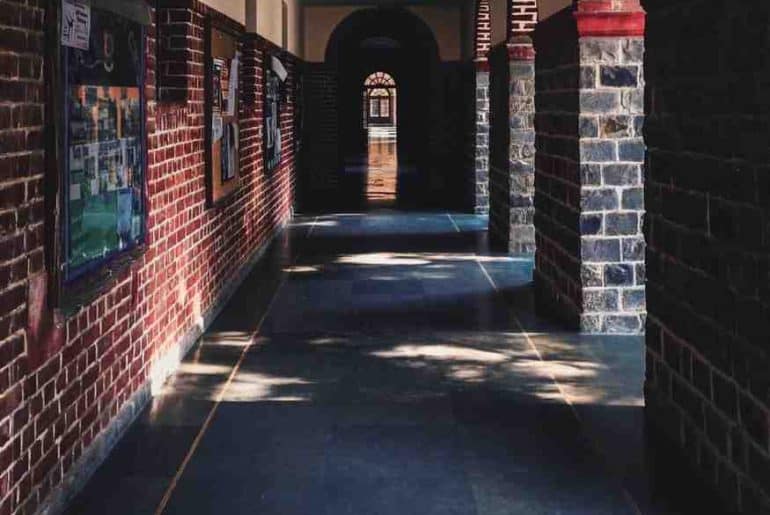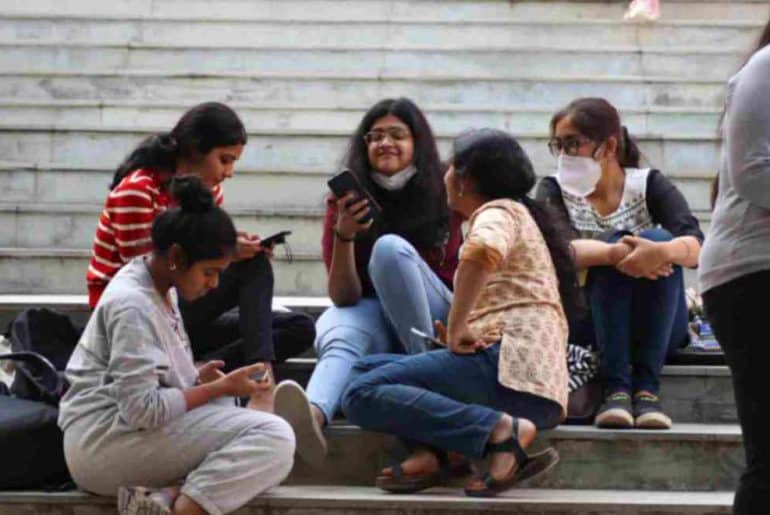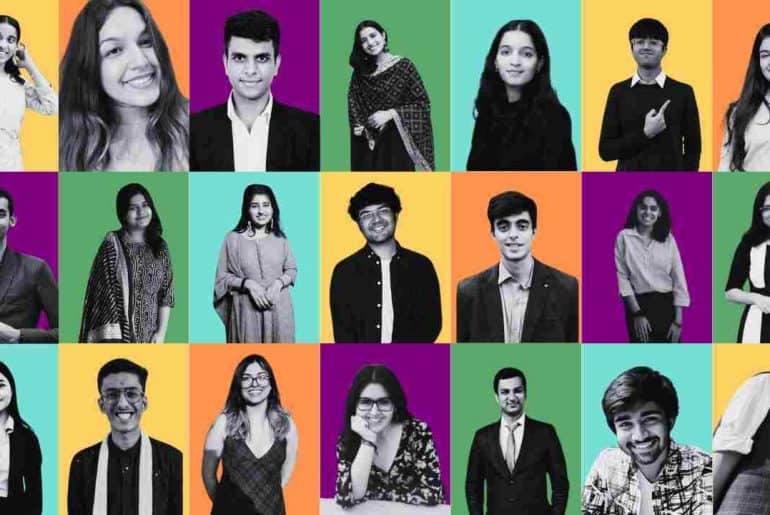From time to time, we come across talented and awe-inspiring individuals who deserve their stories to be told. So, here is to 21 such amazing individuals who have achieved great feats in their lives before even tasting the 21st year of their life.
Tarun Jindal
Hailing from Chandigarh, Tarun Jindal is a B.Com. Honours student, CA Finalist, and President of 180 Degrees Consulting Club at Hindu College, University of Delhi. Having worked with esteemed organisations such as Dhwani Rural Information Systems, UNDP Malaysia, India Accelerator, and Infolso, Tarun is a high-impact achiever and go-getter, who believes in seeing every hardship as a source of inner fortitude and every failure as a test of perseverance. Their consistent commitment to making a difference in the lives of those around them has resulted in tangible social impact, particularly in the fields of healthcare, gender justice, and education.

Kartik Chauhan
A driven start-up enthusiast, Kartik Chauhan is a student at Hindu College and founding member of Delhi Smart Protein Project (DSPP), a project under the aegis of the Good Food Institute to stimulate open-access research, entrepreneurship and climate action through food technology. Recently, he received a full-coverage scholarship to attend the Good Food Conference in San Francisco, USA in recognition of his achievements and contributions. At Hindu College, he in also the President of the Entrepreneurship Cell, leading a 50 member team, and conceptualising, and spearheading the rebranding of the Cell to encourage a ‘builder-centric’ approach to innovation. His other achievements include being a part of Ripen’s first invite-only Entrepreneur in-Residence program, and having built a ‘feedback marketplace’ that was selected in the W22 Batch of GSF Accelerator. With their passion for technology, he are looking forward to turning his own project into an actual start-up soon.
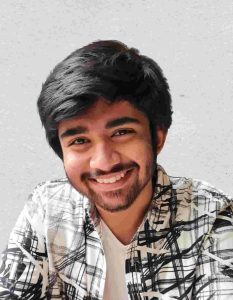
G Brinda
A third-year History Honours student at Lady Shri Ram College for Women (LSR), G Brinda has a passion for policy-making, social work, consumer behaviour, and research. They serve as the General Secretary of Youth India Foundation (YIF), leading 50+ interns at state level and guiding 250+ college chapter members, having founded the LSR, Gargi, IITM (IPU), and Hindu College Chapters of the social entrepreneurship platform. They are a compassionate and empathetic leader, who imbibes this ethos in every position of responsibility that they diligently pursue, including but not limited to State President at the Kerala Impact Consulting Council under WICCI, Content Head at the Global Youth India-Israel Forum, and Editorial Head at Prakriti LSR.

Anshu Narwal
A research-enthusiast and dedicated social volunteer, Anshu Narwal is a student of economics and mathematics at Lady Shri Ram College for Women (LSR). A district-topper and school-topper since their school years, Anshu has furthered their interest in academia by undertaking two impressive research projects in collaboration with professors from esteemed institutions such as IIM Kashipur and IIT Delhi. Their research interests lie in the critical topic of ICT Adoption and Inclusive Growth, addressing issues that are fundamental to our society’s development. Additionally, they are passionate about the fields of psychology and social work, serving as the Project Director for Project AASHA, facilitating workshops on hygiene, unsafe touch, and mental health.
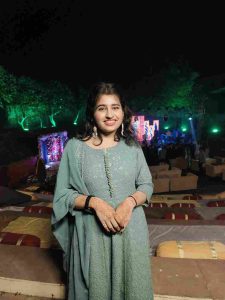
Nirmanyu Chouhan
A Hindu College alum from the Batch of 2023, Nirmanyu Chouhan is a Programme Coordinator at Lokniti, Centre for Study of Developing Societies (CSDS), and former research intern at Newslaundry. Fascinated by the intricate interplay between politics and society, they are a honed researcher and journalist striving towards a more informed citizenry through their work. Beginning their journey within the staff writing rooms of the Hindu College Gazette, Nirmanyu’s experience with media houses such as DU Beat and Newslaundry have allowed them to engage with topics across politics, economy, society, and pop-culture. Their present work at Lokniti-CSDS centres the field of psephology, the study of elections and voting behaviour, which allows them to analyzing voter patterns and understand the pulse of the electorate.
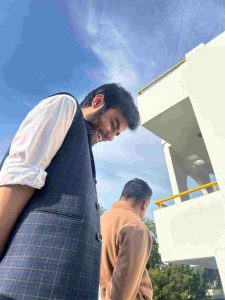
Pulkit Sehgal
A 2023 Management Studies graduate from Shaheed Sukhdev College of Business Studies (SSCBS), Pulkit Sehgal is a driven consulting and finance enthusiast, who has been recognised as an ‘Emerging Leader’ by FinOak, India’s largest student-run finance community. They are the co-founder of Makes Sense, a mental health non-profit aimed at providing social and psychological support to university students. The initiative has impacted 450+ students through free therapy, and catapulted fruitful collaborations with Mindpeers, a Shark Tank-funded and Asia’s fastest growing mental-health platform. Furthermore, they are an Incoming Associate at Boston Consulting Group, and served as the President of 180 Degrees Consulting SSCBS during their college tenure.

Molina Singh
An english literature and history afficionado, Molina Singh is a 2023 alum of Gargi College and founder of Delhi Reads, a 1500+ member citywide book club that has secured successful partnerships with popular coffee chains, bookstores, and publication companies. During their college tenure, they held the position of President of the English Creative Writing Society and spearheaded the organisation of 4 varsity-level fests at Gargi College, a feat of uncprcedented calibre and visionary execution. Their staunch commitment to social-political principles and impact-led community service have made them one who is not afraid to voice their opinions, whether it be in expressing solidarity with the IPCW Fest victims or in their capacity as a student-journalist at DU Beat.

Pranjal Jain
In 2023, Pranjal Jain graduated and immediately embarked on a journey to catalyze positive change. This drive motivated them to pioneer the establishment of India’s inaugural Bridges for Enterprise (BfE) chapter at SSCBS, a milestone aimed at fostering entrepreneurial endeavors with a societal impact. Alongside, they engaged in two consulting and financial advisory projects with socially conscious startups in Nigeria and the Philippines, demonstrating the tangible real-world impact achievable through collaborative initiatives. Moreover, recognizing the pressing need for mental health support among college students, they co-founded Makes Sense, a nurturing and inclusive platform dedicated to destigmatizing mental health discussions and providing essential assistance to those in need.
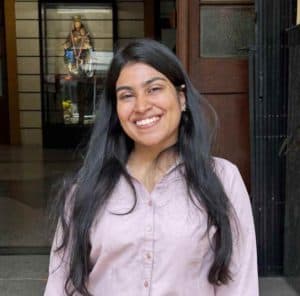
Manvi Bhatt
Having graduated in 2023, Manvi Bhatt was honored to receive the distinguished Sultan Chand Memorial Scholarship Award, recognizing their exceptional academic achievements. Fueled by their entrepreneurial spirit, they actively participated in the development of Mark & Tonic, a digital marketing startup venture, where they served as a founding member. In this role, they led the integration of live projects to address strategic consulting and digital marketing needs. One of their accomplishments is winning the BrAINWARS undergraduate case study competition, a prestigious event hosted by Bain and Company.

Jayesh Rungta
A 20-year-old from Kolkata, Jayesh Rungta recently graduated with a bachelor’s degree in commerce from Hansraj College, University of Delhi. Securing a position as a Business Analyst at the prestigious management consulting firm Kearney, they stand out as the sole and first undergraduate hire for a front-desk consulting role from their college and one of only three selected across the University of Delhi. Demonstrating their commitment to social impact, they served as the Convener and Founding Member of Project Parivartan from January 2021 to March 2023, overseeing a yearly Financial Literacy Drive that reached over 10,000 individuals across three editions.
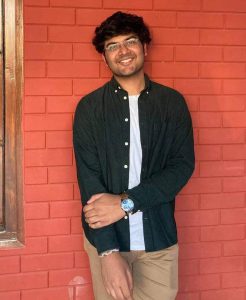
Anjana Jose
As a current psychology student at Jesus and Mary College, Anjana Jose wears multiple hats as an entrepreneur and podcast host. Since June 2023, they have served as the Founder and CEO of BooKing, a platform dedicated to promoting sustainability through the use of second-hand books. Simultaneously, they also host the OnlyGeeks Podcast, a show tailored for college students, which has garnered a listenership of over 100 individuals from diverse backgrounds since its inception in June 2023.

Gavish Lohat
Currently enrolled as a political science student at Hindu College, Gavish Lohat stands as the 1st Raj Bhargava Foundation Scholar, an honor bestowed upon them in 2022. This prestigious scholarship provides them with ₹75,000 annually throughout the duration of his undergraduate studies, along with a tablet. In addition to their academic pursuits, they are also the founder and host of ‘The Skeptical Student Show’ Podcast in collaboration with India Film Project, where they engage in thought-provoking discussions.
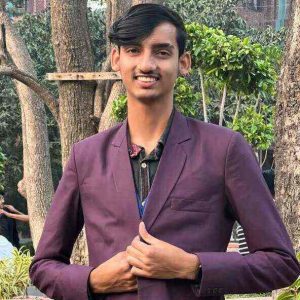
Punya Malhotra
As a final year Economics student at Hansraj College, Punya Malhotra stands as the lone Indian fellow selected for the fully-funded Young Leader’s Fellowship program in 2023 by MCW Global, USA. Their previous roles include working at the Federation of Indian Chamber of Commerce and Industries (FICCI). Additionally, they were featured in the Voices of the Young series by Dr. Subodh Mathur, where they shared insights on optimizing the college experience. As part of their research endeavors, they authored a quantitative paper titled ‘Urban Planning and Gender Inclusivity.’

Apoorva Rathore
Having graduated from Lady Shri Ram College with a degree in B.Com, Apoorva achieved remarkable success by emerging as the National Winner of the EY NextGen Women India competition. This accomplishment propelled them to represent both India and their university at the Global EY NextGen Women Competition held in London. Following their academic achievements, they ventured into the professional realm as a Research Analyst at the Indian Institute of Science. Here, they dedicated over a year to working within the Strategy Team, focused on developing a robust business model for an in-house eVTOL (electric air taxi) project.

Pratham Changoiwala
Pratham Changoiwala is a third-year student of Shaheed Bhagat Singh College, currently pursuing a Bachelor of Commerce. He is interning as an executive assistant at Niamh Ventures, an investment banking firm based out of Gurgaon, Haryana. Alongside that, he is the youngest speaker shareholder of HDFC Bank’s AGM and his experiences were shared as a part of Hindustan Times’ Live Mint as a part of their Gen Z interview series. He has been selected as a delegate for Harvard’s prestigious HPAIR Conference. He was also part of the Sustainable Stories Project, which involved interacting with eco-friendly brand manufacturing units and their business founders. He is also Operations head of Shaheed Bhagat Singh College’s Entrepreneurship Cell.
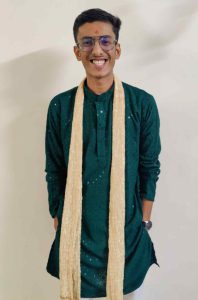
Bhavika Dabur
Bhavika Dabur is a third-year student at Sri Venkateswara College, pursuing a Bachelor of Commerce. They are currently working as a training manager and social media advisor at Aspirant Learning. Previously, they had experience in educational consultancy and soft skills training.

Falguni Mahajan
Falguni Mahajan was a political science student at Lady Shri Ram College. Currently, they are the founder of Mandonna Research Consultants, which focuses on the promotion of gender equity through academia and research work. Previously, they had interned as a researcher at Jawaharlal Nehru University, Policy, Politics and Government Foundation as well as with the Aam Aadmi Party. They hold C1 level certification in the French language as well.

Bhavya Sood
Bhavya Sood was a student at Shaheed Sukhdev College of Business Studies, having completed their BBA in Financial Investment Analysis. They are the co-founder of Project Bridgeway which aims to democratize access to education and guide students, through consulting, which has assisted over 10,000 students across several colleges. They have also served as the first elected deputy chair of IFSA’s Indian wing.
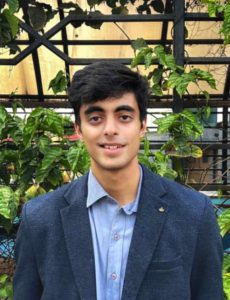
Anjali Batra
Anjali Batra is a political science student at IPCW, Delhi University, who is also pursuing a diploma in Psychology. She is the founder and president of Project Mehviyat, which focuses on empowering victims of abuse in South Asia. She was also recognised as a U21 Global citizen, due to her advocacy for Sustainable Development Goals and is serving as the deputy chairperson of the SDG Council, Global Youth India.

Tanusha Arora
Tanusha Arora is currently in the final year of Bachelor of Management Studies at Shaheed Sukhdev College of Business Studies. Arora has interned at Havells India, in the field of e-commerce as well as a research and market intelligence intern at EXL. She secured a placement in the capacity of an Associate at Samagra | Transforming Governance. She was selected under India Top 14 CEO for One Month Challenge by the Adecco Group. She has recently been felicitated with the coveted Linkedin Top Voice (blue badge) for her insights on marketing, communication and adulting. Moreover, she has been featured in Top 29 Leading Voices of India 2024 by BTalkz. She has a growing community of 7000+ followers and over 6 lakh+ impressions as yet.

Parv Jindal
Parv Jindal is a student of Shaheed Sukhdev College of Business Studies, completing their Bachelor of Management Studies. They founded the India chapter of Bridges for Enterprise, an international impact consulting organization. They have also interned with companies like Blinkit, MakemyTrip, Zomato etc. Jindal is acting Vice President of SSCBS’ Student Council.
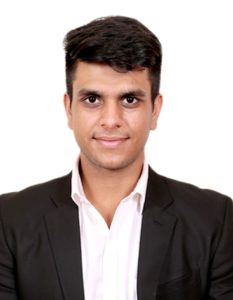
Read Also: DU Beat 21 Under 21: Of Dreams and Determination (2023)

